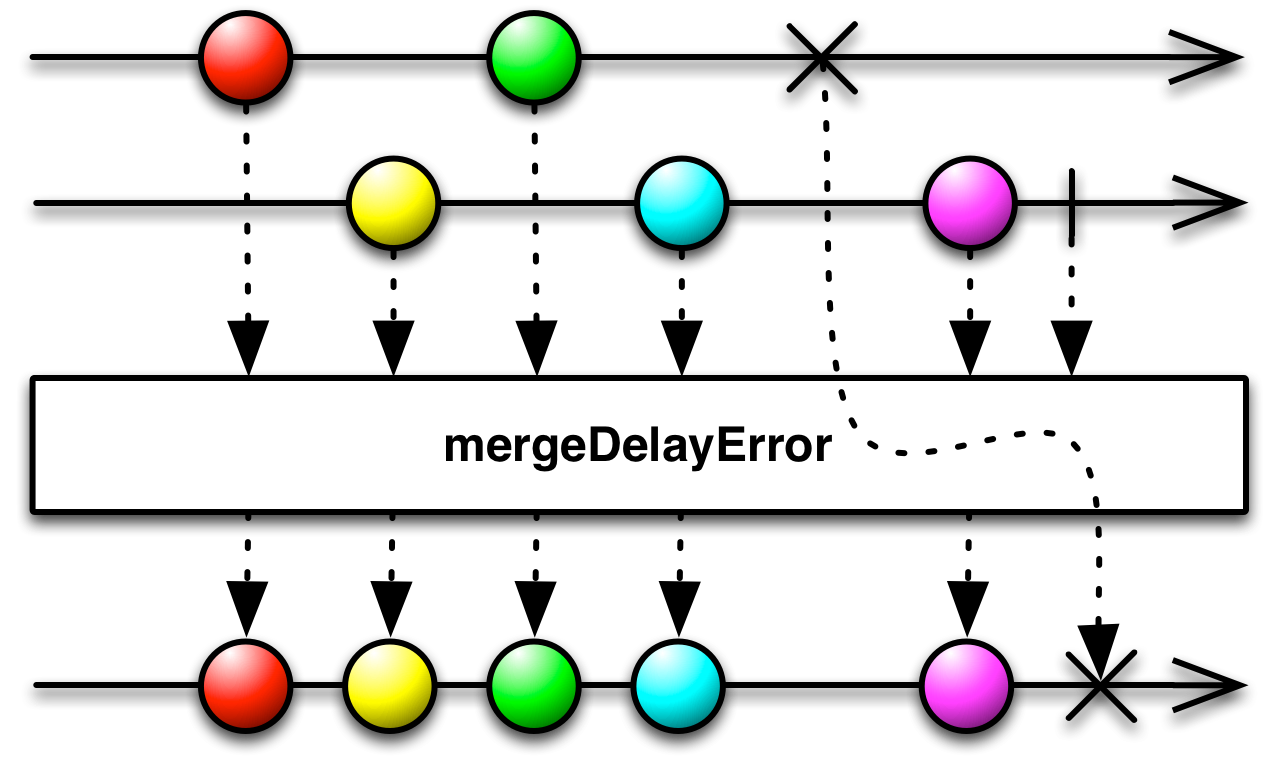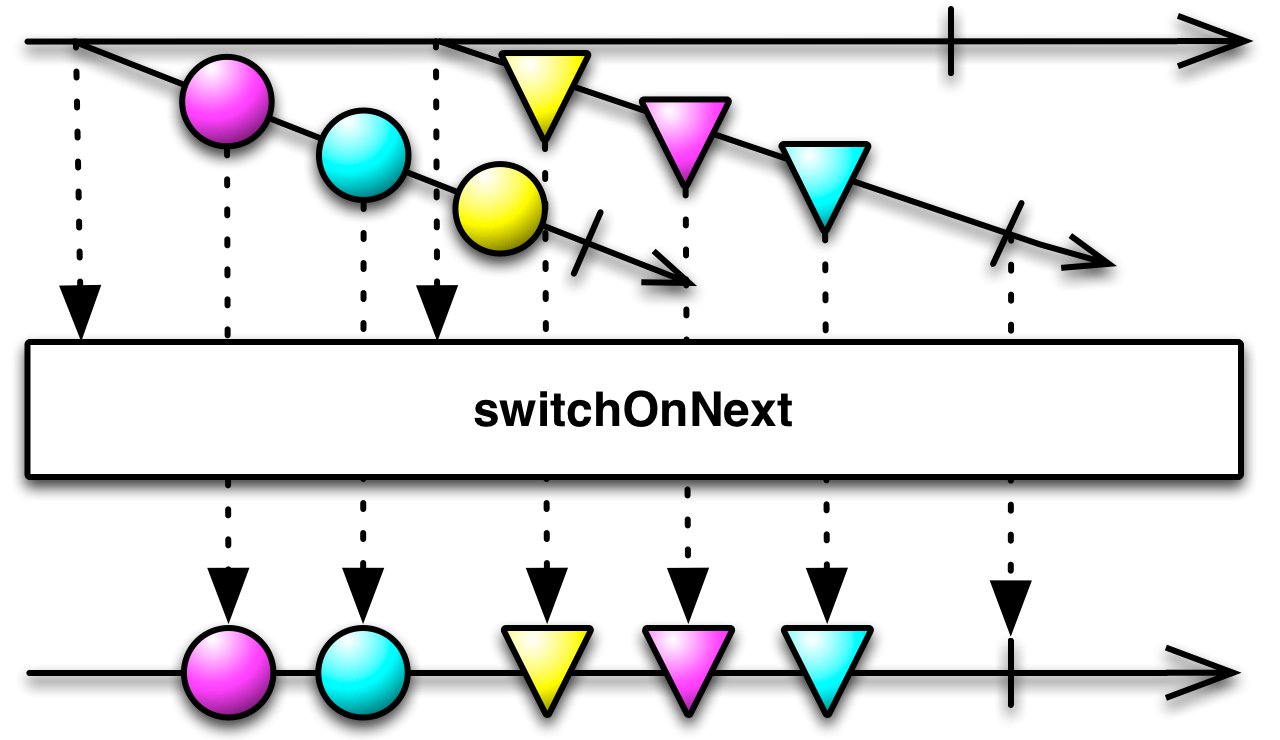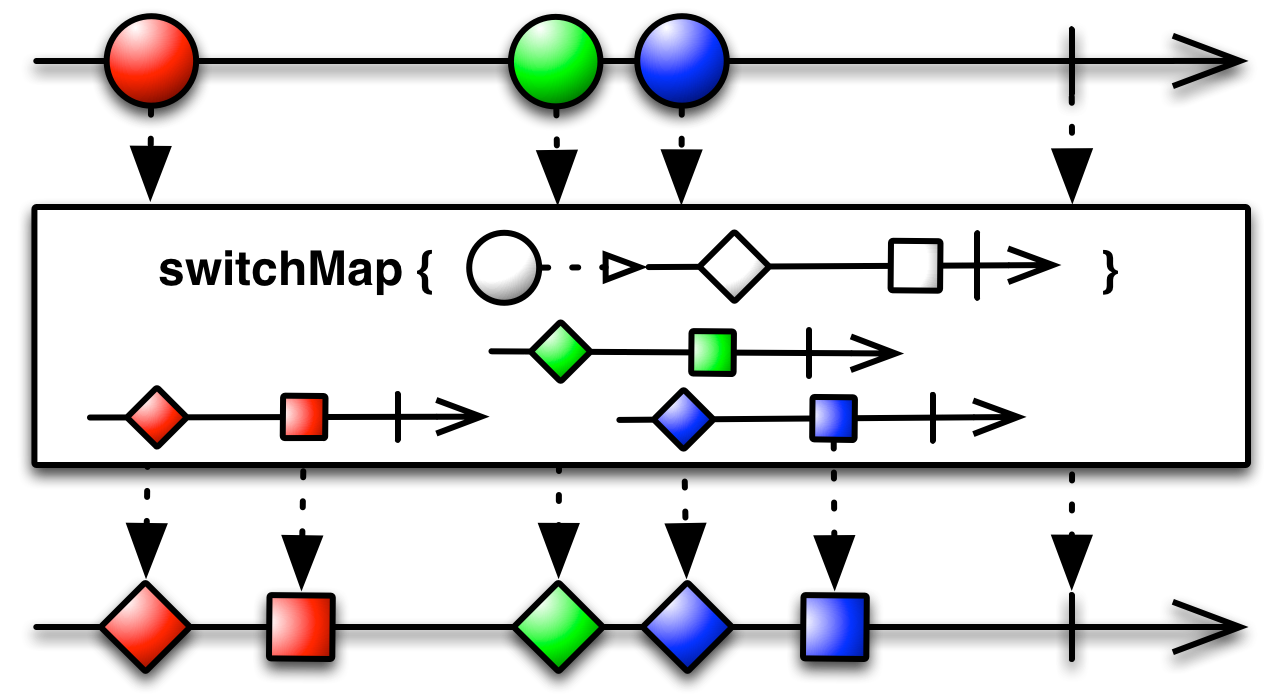
ErrorDelayingObservable
Related Doc:
package observables






EXPERIMENTAL Concatenates the Observable sequence of Observables into a single sequence by subscribing to each inner Observable, one after the other, one at a time and delays any errors till the all inner and the outer Observables terminate.
EXPERIMENTAL Concatenates the Observable sequence of Observables into a single sequence by subscribing to each inner Observable, one after the other, one at a time and delays any errors till the all inner and the outer Observables terminate.
Fully supports backpressure.
This method does not operate by default on a particular Scheduler.
the new Observable with the concatenating behavior

EXPERIMENTAL Maps each of the items into an Observable, subscribes to them one after the other, one at a time and emits their values in order while delaying any error from either this or any of the inner Observables till all of them terminate.
EXPERIMENTAL Maps each of the items into an Observable, subscribes to them one after the other, one at a time and emits their values in order while delaying any error from either this or any of the inner Observables till all of them terminate.
Fully supports backpressure.
This method does not operate by default on a particular Scheduler.
the function that maps the items of this Observable into the inner Observables.
the new Observable instance with the concatenation behavior

EXPERIMENTAL Flattens an Observable that emits Observables into one Observable, in a way that allows an Observer to receive all successfully emitted items from all of the source Observables without being interrupted by an error notification from one of them, while limiting the number of concurrent subscriptions to these Observables.
EXPERIMENTAL Flattens an Observable that emits Observables into one Observable, in a way that allows an Observer to receive all successfully emitted items from all of the source Observables without being interrupted by an error notification from one of them, while limiting the number of concurrent subscriptions to these Observables.
This behaves like flatten except that if any of the merged Observables notify of an
error via onError, it will refrain from propagating that
error notification until all of the merged Observables have finished emitting items.

Even if multiple merged Observables send onError notifications, it will only
invoke the onError method of its Observers once.
This method does not operate by default on a particular Scheduler.
the maximum number of Observables that may be subscribed to concurrently
an Observable that emits all of the items emitted by the Observables emitted by this
(if this graduates from Experimental/Beta to supported, replace this parenthetical with the release number)

EXPERIMENTAL Flattens an Observable that emits Observables into one Observable, in a way that allows an Observer to receive all successfully emitted items from all of the source Observables without being interrupted by an error notification from one of them, while limiting the number of concurrent subscriptions to these Observables.
EXPERIMENTAL Flattens an Observable that emits Observables into one Observable, in a way that allows an Observer to receive all successfully emitted items from all of the source Observables without being interrupted by an error notification from one of them, while limiting the number of concurrent subscriptions to these Observables.
This behaves like flatten except that if any of the merged Observables notify of an
error via onError, it will refrain from propagating that
error notification until all of the merged Observables have finished emitting items.

Even if multiple merged Observables send onError notifications, it will only
invoke the onError method of its Observers once.
This method does not operate by default on a particular Scheduler.
an Observable that emits all of the items emitted by the Observables emitted by this



This behaves like rx.lang.scala.Observable.merge except that if any of the merged Observables notify of an error via onError, it will refrain from propagating that error notification until all of the merged Observables have finished emitting items.
This behaves like rx.lang.scala.Observable.merge except that if any of the merged Observables notify of an error via onError, it will refrain from propagating that error notification until all of the merged Observables have finished emitting items.

Even if multiple merged Observables send onError notifications, it will only invoke the onError method of its
Observers once.
This method allows an Observer to receive all successfully emitted items from all of the source Observables without being interrupted by an error notification from one of them.
an Observable to be merged
an Observable that emits items that are the result of flattening the items emitted by
this and that


EXPERIMENTAL Converts this Observable that emits Observables into an Observable that emits the items emitted by the most recently emitted of those Observables and delays any exception until all Observables terminate.
EXPERIMENTAL Converts this Observable that emits Observables into an Observable that emits the items emitted by the most recently emitted of those Observables and delays any exception until all Observables terminate.

It subscribes to an Observable that emits Observables. Each time it observes one of these emitted Observables, the Observable returned by this method begins emitting the items emitted by that Observable. When a new Observable is emitted, it stops emitting items from the earlier-emitted Observable and begins emitting items from the new one.
This method does not operate by default on a particular Scheduler.
an Observable that emits the items emitted by the Observable most recently emitted by the source Observable

EXPERIMENTAL Returns a new Observable by applying a function that you supply to each item emitted by the source Observable that returns an Observable, and then emitting the items emitted by the most recently emitted of these Observables and delays any error until all Observables terminate.
EXPERIMENTAL Returns a new Observable by applying a function that you supply to each item emitted by the source Observable that returns an Observable, and then emitting the items emitted by the most recently emitted of these Observables and delays any error until all Observables terminate.

This method does not operate by default on a particular Scheduler.
a function that, when applied to an item emitted by the source Observable, returns an Observable
an Observable that emits the items emitted by the Observable returned from applying f to the most
recently emitted item emitted by the source Observable

EXPERIMENTAL An Observable that provides operators which delay errors when composing multiple Observables.